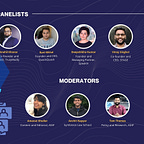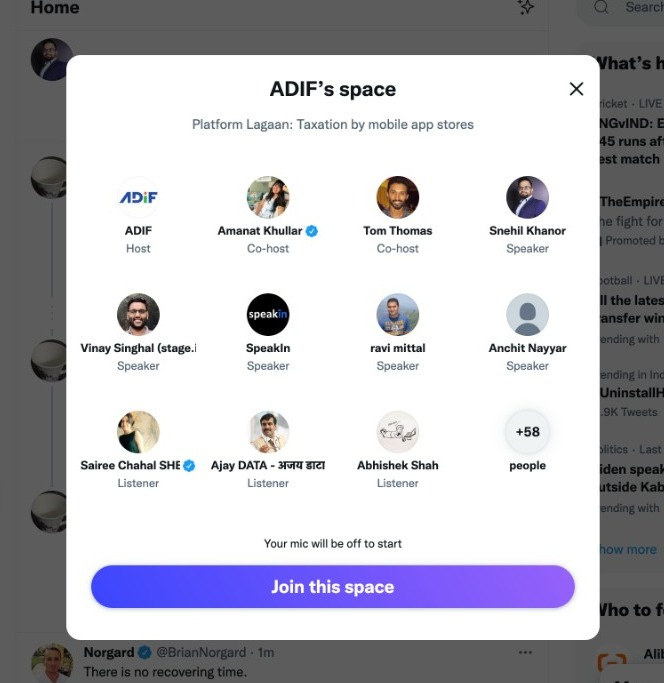ADIF’s panel discussion on Platform Lagaan: Taxation by mobile app stores and its impact on the startup ecosystem was held at 11am on Friday, August 27, on Twitter Spaces.
The event was a part of our online series aimed at spreading awareness around how certain policies of big-tech companies affect our society, individual privacy, and the startup ecosystem.
Following were the panelists and moderators.
Panelists
Snehil Khanor, Co-founder and CEO, TrulyMadly
Ravi Mittal, Founder and CEO, QuackQuack
Deepshika Kumar, Founder and Managing Partner, SpeakIn
Vinay Singal, Co-founder and CEO, STAGE
Moderators
Amanat Khullar, Content and Editorial, ADIF
Anchit Nayyar, Symbiosis Law School
Tom Thomas, Policy and Research, ADIF
ADIF’s stand:
Free internet and fair markets are prerequisites for any ecosystem that aspires to be the best in the world. Our ‘Lagaan Series’ will be focussed on bringing to light anti-competitive practices and challenges facing our Indus Valley startup ecosystem. Unfair markets and anti-competitive practices stifle innovation and adversely impact market outcomes in the long run.
It is crucial that we as an ecosystem uphold fair market principles and ensure that access and opportunity remain both fair and democratised.
Discussion summary: This represents the views of the individual panelists
The panel touched upon the dependence on App Store/PlayStore for the distribution of apps, how the 30% commission affects different sectors – like OTT and ed-tech – how these policies of Big Tech impact the startups in the Indus Valley Ecosystem, the arbitrary nature of these policies for digital services platforms (Netflix etc) vs physical good and services platform (Amazon, Uber etc) and then went on to deliberate on the possible remedies.
Ever since Google announced its PlayStore policy update last October, there has been a lot of hue and cry about certain elements of this policy. So much that Google had to first reduce the commission and then delay the implementation of the new policy. Apple is also engaged in a trial with Epic over its AppStore policies in the US.
The duopoly issue
Introducing the issue, Ravi Mittal, founder and CEO of QuackQuack and a member of the ADIF alliance, said: “Google is acting as a gatekeeper and eating up a major chunk of the developers’ revenue which is going to result in a loss for the developer and a higher cost for the user." This is why, he explained, the developer community is up in arms about the policy that will be implemented in the next few months.
Speaking about the dependence of app developers on Google and Apple’s app stores, Deepshika Kumar, founder and managing partner of SpeakIn, noted: “If you see this entire ecosystem, there are hardly any options in terms of the platform experience, which is heavily dominated by Apple and Google. There are options coming along, but there’s hardly any traction there.” In that case, Indian users are not left with many options. “Between Apple and Google, they have a $100B business.”
‘Detrimental for the OTT industry’
Google and Apple are forcing app developers to use only their payment gateway, and are then charging them a 30% commission. “OTT is a heavy-cost business and we have to already spend a huge amount to create content, and then a lot more to acquire users.” Vinay Singhal, co-founder and CEO of OTT platform STAGE said.
“If on top of that we’ve to pay 30% just to be listed, this basically is killing the entire category. This is probably why most OTT platforms no longer have a payment option on their app,” he added.
Violation of Competition Act
Snehil Khanor, co-founder and CEO of TrulyMadly and a member of ADIF’s Executive Council, pointed out that India’s Competition Act clearly state’s that there must not be any misuse of dominant position. “When you restrict any other payment company from working on the selling of digital goods, you take out a huge chunk of future revenues – not just from these apps but also the payment ecosystem of the country,” he said.
When there is competition, it is complemented by innovation and there are free market forces. Section 4 of competition act says that there should not be any supplementary obligations, which Google and Apple are doing. “Essentially, by March 22, we are being asked to remove all other payment gateways being used on our app. We are then being charged 30% for the same service that others are charging 2% for,” Khanor said.
On top of that, “we receive money once a month, impacting the cash flow and taking away from the profit margin.”
Leaders in innovation to deterrents of innovation
When Google was growing, Microsoft’s browser was the dominant one. At the time, no such charge was imposed on Google for using Microsoft’s services. “Would Google have become this big then?” Khanor questioned.
Arbitrary and ambiguous policies
Google and Apple does not give app developers any special services upon paying the commission. Amazon, Flipkart etc. don’t have to pay the commission since they’re selling physical goods – the same concession is not applicable to dating apps, education apps or OTT platform.
Ravi Mittal provided some global perspective, mentioning that South Korea is working on a bill to abolish this policy. “There is a lagaan on digital transactions which hampers the growth of the country,” Mittal said.
Google and Apple prohibit app developers from informing users about cheaper payment options that would take them out of the app – this will likely lead to delisting of the app. “On Apple, if you allow users to sign up, you’ll have to use Apple’s payment gateway,” he added. “If I have a recurring customer looking to pay for the second or third month, they will again have to use Google/Apple, and the developer will again be charged 30%. It’s like a royalty that one has to keep paying just because a person downloaded the app from their app store.”
Khanor added that the current policies of Google say that one must use Google’s payment system. “So, I can use others but have to include the option of Google – which is happening right now,” he said. The new clause adds that app developers cannot use any other payment gateway expect Google starting from March 2022.
Need for free internet and fair market
We have to raise our voices a bit more louder against such policies – which is also the idea behind ADIF’s formation: Bigger the Alliance, stronger the voice.
“Why should Google and Apple tell me what I should do in my business,” Khanor said. “The government doesn’t take as much tax as these companies do. They’re killing democracy in business.”
He added: “We don’t need a middle ground. Let the free market forces decide what happens. Do not put restrictions. Allow us to choose the payment gateway and then see what happens.”
This, he said, is critical for the overall growth and shaping of the economy.
Amanat Khullar oversees content and editorial at ADIF.
Join the Alliance of Digital India to become a part of our journey to transform India’s startup ecosystem into the best in the world.






